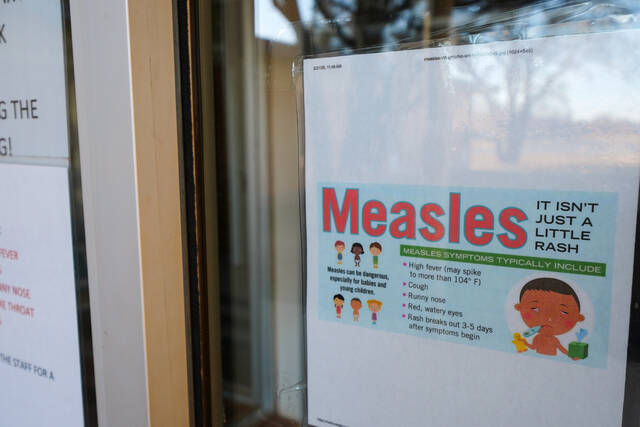Despite concerns about its possible side effects, Western Pennsylvania doctors say some patients can remain on Singulair to relieve asthma or allergy symptoms.
But in most cases, the doctors say they aren’t prescribing the pill as a first-line, or first-time, medication.
The asthma and allergy medicine, also known by its generic name montelukast, has been under increased scrutiny since 2020, when the FDA strengthened existing warnings about possible serious behavioral, mental health and mood-related side effects from the drug, including suicidal thoughts.
The FDA recommends Singulair “should be reserved for those who are not treated effectively with or cannot tolerate other allergy medicines” when used for allergies, and that doctors should “consider the benefits and risks of mental health side effects” before prescribing it for asthma.
A recent investigation by the New York Times found that information about the FDA’s warning hasn’t spread effectively, and some patients and doctors aren’t even aware of the risks of the drug.
Some local doctors say they are aware of the potential dangers of Singulair and have adjusted their prescribing as a result.
“Over the last few years, when we’ve heard concerns about Singulair, we’ve probably been reaching for (it) less often than we had in the past,” said Dr. Billie Barker, a staff physician in pulmonary and critical care medicine at AHN who also serves as chief quality officer for ambulatory medicine.
“In my personal practice, I very rarely start people on Singulair who have not been on it before, because in adult asthma, the incremental benefit to adding Singulair to someone who has not been on it does not seem that significant,” he said.
As what doctors refer to as a “second-line” treatment, Singulair is not typically the first medicine chosen to treat asthma or allergies. It often is used in conjunction with other medications such as antihistamines or inhalers, or when one type of medication alone doesn’t work for the patient.
“We always do it as an add-on,” Barker said. “There’s a couple of inhalers under our guidelines that we typically start before we would consider something like Singulair. In my practice, seeing people with more severe asthma, by the time that patients are seeing me, Singulair would have very little additional benefit. There’s other, more potent medications I would consider before I would consider Singulair.”
Singulair had previously seen increased use in the pediatric population because children were less able to use inhalers properly, Barker said.
“I think that now, over the last few years with the warnings, the use in children has leveled off. And even in adult asthma, I think we’re having fewer new starts for Singulair than we’ve had in the past,” he said.
Exercising caution
While Barker has slowed down on writing new prescriptions for Singulair, if a patient already is taking it and it’s working for them, he’s likely to let them continue, he said.
“We have a lot of patients who have come to us already on it, and as long as they are not experiencing any side effects that we would attribute to Singulair, and especially any sort of psychiatric side effects, a lot of times we are keeping patients on those medications,” he said.
Other doctors find themselves avoiding the drug more frequently. At Westmoreland Allergy and Asthma Associates, Dr. Bob Gorby says that even before the concerns about side effects arose, he’d “never been a big advocate” for Singulair because it was not always effective at doing its job to reduce symptoms.
“A lot of times, people use Singulair and it just wouldn’t work. It would work for about half the people,” he said. “My thought was, it never really worked so well, so why use something that is only going to work half the time?”
If the drug works without side effects for a patient, “that’s great,” Gorby says, but he still says he does not recommend it often.
“I would be more hesitant to prescribe it now with those black box warnings,” he said.
Dr. Thomas Mertz of Allergy and Asthma Associates of Pittsburgh in Harmar also finds that Singulair works well for some people.
“I do have numerous patients who have taken it and find that it is especially helpful, and have tolerated it fine,” he said.
News of the side effects changed how Mertz prescribes Singulair, but it “doesn’t mean you can’t use it,” he said.
“You have to select the right person to use it in. It doesn’t mean that everybody who takes it is going to have these side effects,” he said.
The FDA says patients and their parents or caregivers should stop taking Singulair and talk to a doctor right away if they notice behavior or mood-related changes while taking the medicine.
Mertz and Barker both recommend keeping an eye on any potential symptoms, and talking to patients about the side effect potential ahead of time, especially if the person has a history of mental health issues.
“My approach is I don’t start it in somebody who has previous history of a mood disorder of any type,” Mertz said. “If someone has been on it for a while, I just ask them if it feels that it bothers them, (and) I review the warning with them and talk it over with them. I’ve had people who have been on it for years and don’t feel it bothers them whatsoever, and I have had people who do feel it affects their mood, and they stop it.”
Checking back with patients after starting the medication is an important safety tool, said Dr. Kumar Patel of Advanced Allergy and Asthma in Tarentum and Monroeville. Many of his patients take Singulair, but if he starts a new patient on the drug, he sets an appointment for a month out from the start date to follow up and ask them about any side effects.
“Some people have weird dreams or mood changes. Those kinds of things are predominantly what we see (in terms of side effects),” he said. “Then what we tell the patient is, ‘OK, we will discontinue the medication.’ ”
All medications have potential side effects, Patel said.
“The goal is to get you under control and get you feeling better with the lowest amount of medications you need,” he said. “If there’s a safer alternative, we’ll always switch to that.”
If Singulair’s side effects were bad enough that it was unsafe for everyone, Mertz said, it would not be on the market.
“It has its place in therapy. It is a second-line agent, but I think it also has helped a number of people,” he said. “If the FDA thought it was such a large risk that it wasn’t helpful, they would have removed it from market. They didn’t do that; they just strengthened the warning. And by doing so, they just educated people about what the potential side effects are.”








